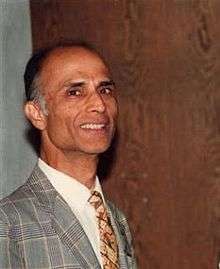Harish-Chandra
Harish-Chandra FRS[2] (11 October 1923 – 16 October 1983) was an Indian American mathematician and physicist who did fundamental work in representation theory, especially harmonic analysis on semisimple Lie groups.[3][4][5]
Harish-Chandra | |
|---|---|
 | |
| Born | 11 October 1923 |
| Died | 16 October 1983 (aged 60) |
| Citizenship | United States[1] |
| Alma mater | University of Allahabad University of Cambridge |
| Known for | Harish-Chandra's c-function Harish-Chandra's character formula Harish-Chandra homomorphism Harish-Chandra isomorphism Harish-Chandra module Harish-Chandra's regularity theorem Harish-Chandra's Schwartz space Harish-Chandra transform Harish-Chandra's Ξ function |
| Awards | Fellow of the Royal Society[2] Cole Prize in Algebra (1954) Srinivasa Ramanujan Medal |
| Scientific career | |
| Fields | Mathematics, Physics |
| Institutions | Indian Institute of Science Harvard University Columbia University Tata Institute of Fundamental Research Institute for Advanced Study |
| Doctoral advisor | Paul Dirac |
Early life
Harish-Chandra was born in Kanpur.[6] He was educated at B.N.S.D. College, Kanpur and at the University of Allahabad.[7] After receiving his master's degree in Physics in 1943, he moved to the Indian Institute of Science, Bangalore for further studies in theoretical physics and worked with Homi J. Bhabha.
In 1945, he moved to University of Cambridge, and worked as a research student under Paul Dirac.[7] While at Cambridge, he attended lectures by Wolfgang Pauli, and during one of them pointed out a mistake in Pauli's work. The two were to become lifelong friends. During this time he became increasingly interested in mathematics. At Cambridge he obtained his PhD in 1947.
Honors and awards
He was a member of the National Academy of Sciences and a Fellow of the Royal Society.[2] He was the recipient of the Cole Prize of the American Mathematical Society, in 1954. The Indian National Science Academy honoured him with the Srinivasa Ramanujan Medal in 1974. In 1981, he received an honorary degree from Yale University.
The mathematics department of V.S.S.D. College, Kanpur celebrates his birthday every year in different forms, which includes lectures from students and professors from various colleges, institutes and students' visit to Harish-Chandra Research Institute.
The Indian Government named the Harish-Chandra Research Institute, an institute dedicated to Theoretical Physics and Mathematics, after him.
Robert Langlands wrote in a biographical article of Harish-Chandra:
He was considered for the Fields Medal in 1958, but a forceful member of the selection committee in whose eyes Thom was a Bourbakist was determined not to have two. So Harish-Chandra, whom he also placed on the Bourbaki camp, was set aside.
He was also a recipient of the Padma Bhushan in 1977.[8]
References
- A Biographical Memoir
- Langlands, Robert P. (1985). "Harish-Chandra. 11 October 1923 – 16 October 1983". Biographical Memoirs of Fellows of the Royal Society. 31: 198–225. doi:10.1098/rsbm.1985.0008. JSTOR 769925.
- Harish-Chandra at the Mathematics Genealogy Project
- O'Connor, John J.; Robertson, Edmund F., "Harish-Chandra", MacTutor History of Mathematics archive, University of St Andrews.
- Varadarajan, V. S. (1984). "Harish-Chandra (1923–1983)". The Mathematical Intelligencer. 6 (3): 9–13. doi:10.1007/BF03024122.
- http://www.hri.res.in/about/harish-chandra/
- http://www-history.mcs.st-andrews.ac.uk/Biographies/Harish-Chandra.html
- "Padma Awards" (PDF). Ministry of Home Affairs, Government of India. 2015. Retrieved 21 July 2015.
Publications
- Harish-Chandra (1968), Mars, J. G. M. (ed.), Automorphic forms on semisimple Lie groups, Lecture Notes in Mathematics, 62, Berlin, New York: Springer-Verlag, doi:10.1007/BFb0098434, ISBN 978-3-540-04232-7, MR 0232893
- Harish-Chandra (1970), Dijk, G. van (ed.), Harmonic analysis on reductive p-adic groups, Lecture Notes in Mathematics, 162, Berlin, New York: Springer-Verlag, doi:10.1007/BFb0061269, ISBN 978-3-540-05189-3, MR 0414797
- Harish-Chandra (1984), Varadarajan, V. S. (ed.), Collected papers. Vol. I. 1944–1954., Berlin, New York: Springer-Verlag, ISBN 978-0-387-90782-6, MR 0726025
- Harish-Chandra (1984), Varadarajan, V. S. (ed.), Collected papers. Vol. II 1955–1958., Berlin, New York: Springer-Verlag, ISBN 978-0-387-90782-6, MR 0726025
- Harish-Chandra (1984), Varadarajan, V. S. (ed.), Collected papers. Vol. III 1959–1968., Berlin, New York: Springer-Verlag, ISBN 978-0-387-90782-6, MR 0726025
- Harish-Chandra (1984), Varadarajan, V. S. (ed.), Collected papers. Vol. IV 1970–1983., Berlin, New York: Springer-Verlag, ISBN 978-0-387-90782-6, MR 0726025
- Harish-Chandra (1999), DeBacker, Stephen; Sally, Paul J. (eds.), Admissible invariant distributions on reductive p-adic groups, University Lecture Series, 16, Providence, R.I.: American Mathematical Society, doi:10.1090/ulect/016, ISBN 978-0-8218-2025-4, MR 1702257
Bibliography
- Doran, Robert S.; Varadarajan, V. S., eds. (2000), "The mathematical legacy of Harish-Chandra", Proceedings of the AMS Special Session on Representation Theory and Noncommutative Harmonic Analysis, held in memory of Harish-Chandra on the occasion of the 75th anniversary of his birth, in Baltimore, MD, January 9–10, 1998, Proceedings of Symposia in Pure Mathematics, 68, Providence, R.I.: American Mathematical Society, pp. xii+551, doi:10.1090/pspum/068, ISBN 978-0-8218-1197-9, MR 1767886
- Srivastava, R. S. L. (1986), "About Harish Chandra", Gaṇita Bhãrati. Indian Society for History of Mathematics. Bulletin, 8 (1): 42–43, ISSN 0970-0307, MR 0888666
- Varadarajan, V. S. (2008), "Harish-Chandra", Complete Dictionary of Scientific Biography
External links

- Biography by Roger Howe